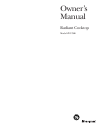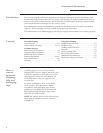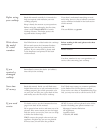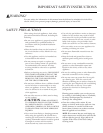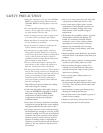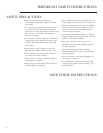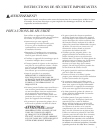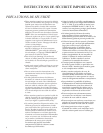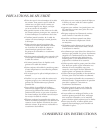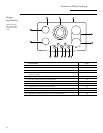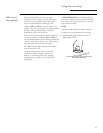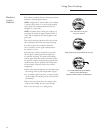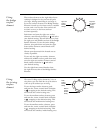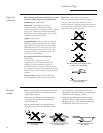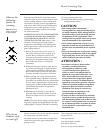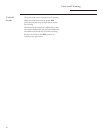
SAFETY PRECAUTIONS
• When the cooktop is cool, use only CERAMA
BRYTE
®
Ceramic Cooktop Cleaner and the
CERAMA BRYTE
®
Cleaning Pad to clean the
cooktop.
• To avoid possible damage to the cooking
surface, do not apply the cleaning cream to
the glass surface when it is hot.
• After cleaning, use a dry cloth or paper towel
to remove all the cleaning cream residue.
• Read and follow all instructions and warnings
on the cleaning cream labels.
• Large scratches or impacts to cooktops can
lead to broken or shattered glass.
• Do not operate the glass surface elements
if the glass is broken. Spillovers or cleaning
solution may penetrate a broken cooktop and
create a risk of electrical shock. Contact a
qualified technician immediately should your
glass cooktop become broken.
• Use care when touching the cooktop. The
glass surface of the cooktop will retain heat
after the controls have been turned off.
• Do not touch surface elements. These surfaces
may be hot enough to burn even though they
are dark in color. During and after use, do not
touch, or let clothing or other flammable
materials contact the surface elements or
areas near surface elements; allow sufficient
time for cooling first.
• Potentially hot surfaces include the cooktop
and areas facing the cooktop.
• Cook meat and poultry thoroughly—meat to
at least an INTERNAL temperature of 160°F
and poultry to at least an INTERNAL
temperature of 180°F. Cooking to these
temperatures usually protects against
foodborne illness.
• Never leave the surface elements unattended
at high heat settings. Boilovers cause smoking
and greasy spillovers that may catch on fire.
• Use proper pan size—select cookware having
flat bottoms large enough to cover the surface
element’s heating area. The use of undersized
cookware will expose a portion of the surface
element to direct contact and may result in
ignition of clothing. Proper relationship of
cookware to surface element will also improve
efficiency. See the Cookware Tips section of
the manual.
• Never try to move a pan of hot fat, especially
a deep-fat fryer. Wait until the fat is cool.
• Only certain types of glass, glass/ceramic,
earthenware or other glazed containers are
suitable for cooktop cooking; others may
break because of the sudden change in
temperature.
• To minimize the possibility of burns, ignition
of flammable materials and spillage, the
handle of a container should be turned
toward the center of the cooktop without
extending over nearby surface elements.
• Always keep combustible wall coverings,
curtains or drapes a safe distance away from
your cooktop.
• Always keep dish towels, dishcloths, pot holders
and other linens a safe distance away from your
cooktop.
• Do not leave paper products, cooking utensils
or food on the cooktop when not in use.
• Avoid scratching the glass cooktop. The
cooktop can be scratched with items such
as sharp instruments, rings or other jewelry
and rivets on clothing.
• Never use the glass cooktop surface as a
cutting board.
• Be careful when placing spoons or other
stirring utensils on glass cooktop surface when
it is in use. They may become hot and could
cause burns.
• Avoid heating an empty pan. Doing so may
damage the cooktop and the pan.
• Do not allow water, other liquids or grease to
remain on the cooktop.
• Always heat fat slowly, and watch as it heats.
• Clean only parts listed in this manual.
5



